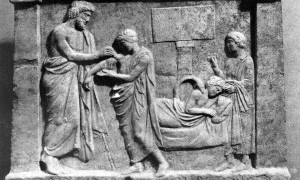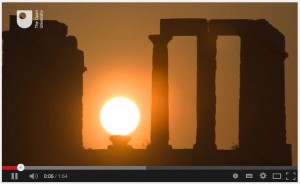The Open University is delighted to be able to offer three fully-funded EDI scholarships for teachers in UK state schools wishing to study either of the following Open University modules:
- A229 Exploring the Classical World
- A276 Classical Latin: The Language of Ancient Rome
These scholarships, funded by the OU’s Faculty of Arts & Social Sciences, will be awarded to UK schoolteachers who intend to introduce or develop the provision of Classical Civilisation or Latin in the curriculum of the non-fee-paying school or college where they work. They are open to teachers of any discipline and at any level (primary, secondary or tertiary) looking to develop their knowledge of the ancient worlds of Greece and Rome and/or Latin language and Roman culture with this aim in mind.
In the award of these scholarships, preference will be given to:
- teachers working in schools with a high proportion of students from backgrounds which are traditionally under-represented in the teaching of classical subjects, e.g. those from a Black, Asian or Minority Ethnic background and/or where a high percentage of pupils are eligible for Free School Meals;
- teachers from backgrounds which are traditionally under-represented in the teaching of classical subjects, e.g. those from a Black, Asian or Minority Ethnic background (including people with a mixed ethnic background) or from a working class background.
These scholarships are open to those teaching in non-fee-paying primary and secondary schools as well as sixth form colleges. Please note that applicants will normally be expected to have worked for at least two years as a teacher.
Studying with the Open University
A229 Exploring the Classical World and A276 Classical Latin: The Language of Ancient Rome are 60-credit modules, requiring regular study each week. Students are supported by a dedicated tutor, enjoy access to regular tutorials, and study using a combination of printed and online materials. The Open University’s distance learning model gives students the flexibility to study where and when they want. Modules run from October to May and are assessed via a series of assignments submitted throughout the year.
A229 Exploring the Classical World
This module provides an introduction to the worlds of ancient Greece and Rome. It covers a range of topics such as Homer’s poetry and the society where it was created; Athens in the fifth century BCE; republican Rome; and Roman social history. This module explores ancient poetry, prose, drama and historical texts in English translation along with art, architecture and archaeological evidence to help you build up a solid understanding of key periods of classical history and culture. The material covered provides a strong foundation for the teaching of Classical Civilisation up to GCSE level (or National 4/5 Classical Studies in Scotland).
Further information about Exploring the Classical World is available on the OU website , and on our departmental website.
A276 Classical Latin: The Language of Ancient Rome
This module combines a beginners’ course in Latin with the study of Roman culture and literature in translation. You’ll learn the core principles of the language, while also exploring a range of Latin texts in translation (including Livy, Virgil, Ovid, and Horace) from literary, cultural, and historical angles. The module focuses on the themes of Roman identity, Rome’s origins, and the use of stories from the past in Augustan Rome. The material covered provides a strong foundation for the teaching of Latin up to GCSE level (or National 4/5 in Scotland).
Further information about Classical Latin: The Language of Ancient Rome is available on the OU website, and on our departmental website.
What’s included in the scholarship
The Open University EDI scholarships consist of a grant of £3,228 to cover the full cost of the tuition fees for the module.
Successful candidates will be provided with support and advice on developing or introducing classical subjects in their school and are asked to provide a report on their progress following their completion of the module.
Developing the teaching of classical subjects in schools
There is good support available for teachers looking to introduce classical subjects into state schools provided by the charity Classics for All. For more details, go to the Classics for All website and click on ‘My school wants classics’. The ACE project website (Advocating Classics Education) also provides useful advice for those wishing to develop Classical Civilisation (and Ancient History) in their schools. Charities such as the Roman Society and Hellenic Society can provide grants of up to £500 for classroom resources and books.
Applicants may be interested in the panel discussion at the Open University’s Advocating Classics Education event in 2019, in which representatives of the ACE project, Classics for All and a schoolteacher with recent experience of developing Classical Studies provision in a state secondary school shared their experiences and offered guidance and advice. The full discussion is available online here.
Note that your plans to introduce or develop classical subjects in your school need not necessarily mean offering a formally examined course (such as a GCSE). Your plans might instead involve introducing classical content into other subject areas, teaching classics-related classes or clubs off-timetable or offering Latin as a foreign language at KS2, for example. Please outline your plans and their expected impact (e.g. in terms of student numbers) in your application.
How to apply
To apply for the scholarship, please complete the EDI-scholarship-application-form-July-2022 and send it to [email protected]. With the form you should also send:
- a separate curriculum vitae (CV) of no more than two pages;
- a copy of your degree certificate (or a transcript of your degree that makes clear the level of your academic achievement);
- a statement from your headteacher indicating that they are willing to support your plans to introduce or develop Classical Civilisation or Latin in your school or college. (This need be no more than one side of A4.)
The application form includes a section for a short personal statement (of no more than 800 words). You should use this section to outline:
- the nature of the school you work in and its student body (where possible, please provide information on the percentage of pupils with English as an Additional Language, Special Educational Needs and Free School Meals, plus a link to the latest Ofsted report);
- how you propose to develop the provision of classical subjects in your school;
- how the scholarship will facilitate greater access to classics for those from backgrounds which are traditionally under-represented in the field (this may apply either to you as the candidate and/or to your students);
- your teaching experience to date;
- your need for the qualification;
The successful applicants will be selected on the basis of this statement, their eligibility, and their academic and professional achievements to date, also taking into account the level of support from the school or college.
The scholarships will not be awarded to students receiving full funding from other funding bodies. It is not necessary to register for the OU study before making this application.
The Open University is proud to promote diversity in education and we welcome applications from all sections of the community. If it would help to have the application in an alternative format, please contact [email protected].
The deadline for applications is 4pm on Monday July 18, 2022 and we intend to inform all applicants in August.
(Note this is deadline has been extended following an earlier call for applications to allow candidates more time to apply.)
Informal enquiries about these scholarships can be made to: Prof James Robson ([email protected]).


